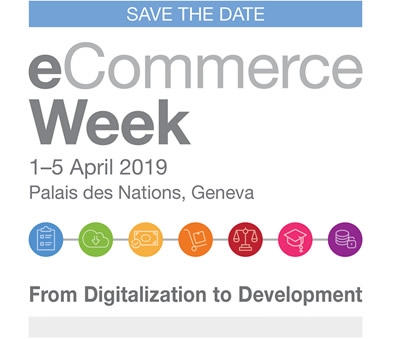Blockchains in trade logistics – implications for developing country Integration in global supply chains
4 Apr 2019 15:00h - 16:30h
Event report
[Read more session reports and live updates from the UNCTAD E-commerce Week]
The session ‘Blockchains in Trade Logistics: Implications for Developing Country Integration in Global Supply Chains’ took place in Geneva, Switzerland on 4 April 2019. The goal was to give a better understanding of the potential applications of the distributed ledger in supply chain management and logistics, along with a focus on the challenges and opportunities for developing countries.
Ms Shamika Sirimanne (Director, Division on Technology and Logistics, UNCTAD) introduced the session. She told the audience that blockchain technology has great potential to ensure accuracy and transparency and to help reduce the major hurdles that SMEs continue to face. However, there are still challenges and it is important to minimise risks and increase opportunities. She introduced the moderator, Mr Brian Iselin (CEO, Slavefreetrade). The session began with a video to help the audience better understand some of the concepts discussed during the panel. The first panellist, Mr Ziyang Fan (Head of Digital Trade, World Economic Forum), was asked by Iselin ‘who will be likely winners and losers?’ Fan responded that it is first important to talk about what we are winning and losing; a distributed ledger can save processing time, reduce transaction costs, reduce errors, accelerate the digitisation process, and increase trust due to its transparent nature. Winners can potentially be shipping companies because of faster clearance in customs, regulators such as governments, and consumers, since blockchain can provide cheaper and faster services from suppliers. The next panellist, Mr Alvaro Cedeno (Consultant and Former Ambassador of Costa Rica to the WTO Intelligent Tech & Trade Initiative), spoke about climate change. He said that we need to keep in mind that within the next ten years we will see a dramatic climate change, which needs to be factored into this equation to see the big picture for the future. There are still many people throughout the world who have not received benefits from the third industrial revolution or even from the second industrial revolution. Lastly, he mentioned, whatever technology we are moving towards we need something that will help regenerate this world. Alexander Varvarenko (CEO and Founder ShipNEXT) stated that not only is blockchain a distributed ledger, but it is also an algorithm that is very important to ensure transparency. It enables the integration of many digital flows from everywhere and offers interoperability in global standards.
Mr André Simha (Global Chief Information Officer, MSC Mediterranean Shipping Company S.A.) was asked his opinion on how to promote technological innovation while avoiding monopolistic outcomes. Simha replied that whatever is designated data should not be in one area, and there should be some form of regulation. At this point, Fan interjected that since there is a lot of money involved in blockchain especially in this early stage, and since most people want a financial return, this brings up the possibility of its becoming monopolistic and clashing with its original purpose. Ms Cram-Martos (CEO, Triangularity SàRL) spoke regarding the role of intergovernmental organisations in three areas: governance, literacy, and tools. Governments would be prepared to use this technology; however, legislation is needed. Legislation is particularly needed to prevent companies and government agencies using blockchain technology in an inappropriate way. Literacy is also needed to understand the most efficient and practical ways to implement blockchain technology and to use this technology in many areas as a tool. Finally, Cram-Martos mentioned that interoperability is important for competition, a set standard is needed to allow different blockchains to communicate with each other.
By Jainee Feliz-Cabrera
Related topics
Related event

eCommerce Week 2019: From Digitalization to Development
1 Apr 2019 15:45h - 5 Apr 2019 15:45h
Geneva, Switzerland
